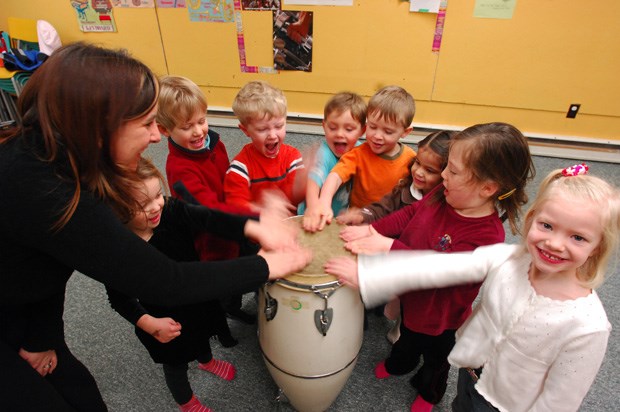After 35 years of melodies, Capilano University’s community music program is set to silence its strings at the end of August – much to the chagrin of parents.
Toddlers and young children learned to play ukulele, piano, guitar, and xylophone through the program’s Saturday morning and after-school sessions at the university as well as classes at satellite locations.
“It was a hard decision,” acknowledged university president Kris Bulcroft. “About a year ago, we decided community music school – although we’re very proud of it – is not really our core mission.”
The university’s decision to cut a profitable program that drew 236 students – including children from New Westminster, Delta, Richmond and Vancouver – for its spring semester, befuddled music instructor Justin O’Donohue, who has taught at the school since 2010.
The program should be a “point of pride” for Cap, according to O’Donohue. “It’s the best program of its kind.”
The community music school generated a little more than $260,000 last year, putting it $89,000 in the black.
The university cut the program to free up space for Cap’s swelling music program, said Bulcroft.
While program enrolment has grown, “space has not,” Bulcroft noted.
“Some of these students are here, gosh, I would say a good 12 or 15 hours a day,” she said. “If the rooms were available for our jazz students I’m quite certain they would be used.”
As a former jazz studies student at Cap, O’Donohue said the notion the community music school was keeping the university’s students from practice space was unfounded.
“If room space is an issue, which it appears completely not to be … we would be more than willing to work with the music program to try to find other space.”
With the exception of piano courses, the community music school could be taught elsewhere, O’Donohue added.
“I could use any classroom on campus and there’s hundreds of them.”
After four years of watching daughter Katie Rose make music at the school, parent Kim Branch wondered if the university was thinking long term.
“These are the students that could be your future students,” she said.
The assumption the community music school acts as a feeder program for the university is misguided, according to Bulcroft.
“The data doesn’t support that,” Bulcroft said when asked about Branch’s concerns. “A lot of the students who have come to the music school do not go on to Capilano.”
By marrying traditional music instruction to the principles of developmental psychology, the program, particularly its Kodaly Orff classes, created a “laboratory for young minds,” according to parent Nick Boudin.
“They made it fun and safe for kids to explore their creativity,” he said.
After being pleased with his daughter’s experience in the program, Boudin is currently searching for a similar school for his four-year-old son. Given the logistical challenges of moving the entire program off-campus, Boudin said he hopes the school will give the program a one-year extension.
“It’s too much of a treasure to just let it go without any kind of consultation.”
There won’t be a stay of cancellation, according to president Bulcroft.
“The decision’s been made,” she said. “I don’t see the merit, nor do the other members of the executive team, in postponing the decision.”
The courses will run through the summer, allowing “adequate time” for parents to find other music programs, Bulcroft said.
Running the program without Capilano University will be a strain, according to O’Donohue.
“I don’t think we’re going to simulate the program ourselves if we’re not able to keep it at the university.”



